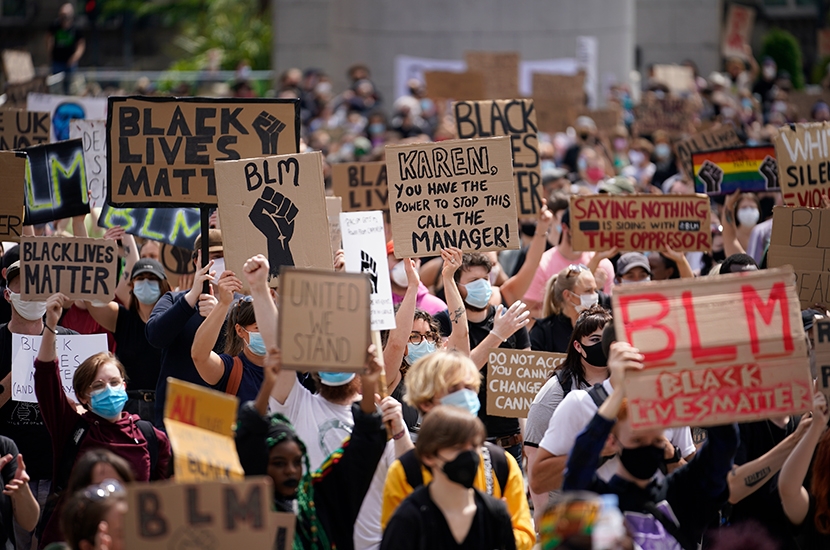When the Black Lives Matter protests struck London in the same week that Public Health England published a report into the higher death rate from Covid among the black and ethnic minority population, the Prime Minister did not quite know how to react. He did what modern Prime Ministers so often do when presented with a little difficulty: he kicked the matter into touch by appointing a commission — on ‘race and ethnic disparities’.
At least the person charged with overseeing the commission, Equalities Minister Kemi Badenoch, was brave enough to challenge those who were lazily trying to make out Britain is a racist hellhole. Britain is, she asserted in the Commons, ‘one of the best countries in the world to be a black person’. This caused uproar, but it’s indisputably true, as evidence out this week has shown.
Trying to pigeonhole us all into ethnic groups is driving people apart
The Office of National Statistics (ONS) published its figures for pay disparity between ethnic groups — and it must have made painful reading for Britain’s tiny and dwindling band of white supremacists. The ethnic group called ‘White British’ came only fifth in the pay rankings, with a median hourly pay that is 7 per cent lower than ‘White and Asian’, 16 per cent below ‘Indian’, 23 per cent below ‘Chinese’ and a whacking 41 per cent below ‘White Irish’. Among the under-30s, the ‘White British’ come out even worse: they are fifth from bottom, earning 2 per cent less than ‘Bangladeshi’, 3 per cent less than ‘Black Caribbean’, 13 per cent less than ‘Black African’, 15 per cent less than ‘Indian’ and 46 per cent less than ‘Chinese’.
So does this mean that white British are the new oppressed, and that they should be protected against racial discrimination in the workplace? Not at all. There are innocent explanations for many of these disparities.The Chinese population in Britain, for example, is disproportionately made up of highly educated and well-qualified people who have come here to work — we haven’t had a mass migration of low-skilled Chinese workers. The same for white Irish. Once you adjust the figures for qualifications, the pay disparity all but disappears.The pay figures demonstrate that if you treat the numbers selectively, you can find statistics to support any grievance. Black people oppressed? Pick the figures for older workers. White people oppressed? Pick the figures for the under-25s, taking care to exclude the Irish. A considered and rounded reading of the ONS figures shows that there is strikingly little discrimination going on in the British workplace — but of course that serves very few people’s agendas.
Perhaps this is why this week’s figures received hardly any attention: they showed pay disparity at an eight-year low. Had they shown rising disparity, on the other hand, they would have made the front pages — with the suggestion that it was all down to racism. Politicians would have been asked to atone. Perhaps Sir Keir Starmer would have had to ‘take the knee’ again, as he did a few months ago.
The brave option for the government would simply be to remove the duty for businesses to report ethnicity data. It would save considerable bureaucracy and end this rather sinister activity of trying to classify every-one into racial or ethnic groups. In reality, few of us think along these lines. Trying to pigeonhole people into such groups is driving us apart. A great many of us would prefer to unite under one label: British.
But if the government is not brave enough to dump the whole business of ethnic classification, it might at least use the data to counter its critics and show that in most respects Britain is a hugely successful melting pot where, on the whole, people from different backgrounds live and work alongside each other with little tension. There are too few countries in the world about which this can be said.
None of this is to claim, of course, that there is no racism in Britain. There is, and where it exists it must always be condemned. Yet it is the exception rather than the rule, and should not be used to try to establish a narrative that Britain is a country unable to escape its history. There is, incidentally, a legacy of colonisation in Britain’s relations with the rest of the world, but it is not one of which we should feel ashamed — it is the Commonwealth, a family of nations with many shared economic and cultural traditions. If that legacy is so toxic, why are so many countries happy to bind themselves with Britain in such an organisation?
The government was slow to react to the Black Lives Matter protests in June, and as a result found itself on the defensive. It need not have. The real issue that needs addressing now is not small statistical disparities between ethnic groups which can be explained in different ways. It is how to get the economy back on its feet so that economic opportunities are available to all. The biggest problem with Britain is not innate racism but that it is still deep in recession, with an economy that is a tenth smaller than it was a year ago.






Comments